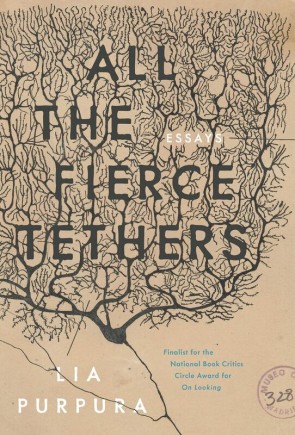All the Fierce Tethers

Buy This Book
From: Foreword Reviews.
*** Starred Review
“Metaphors get compromised. Get eroded and need updating. Rerouting. Reconstituting,” writes Lia Purpura. This is just one of the luminous themes mined in her glittering new essay collection All the Fierce Tethers. In prose that is inventive, with ideas that contract and dilate with fluidity, Purpura considers the mundane and crafts powerful essays that traverse the landscapes that surround us.
From the opening essay of this twenty-essay collection “Scream or Never Minding,” Purpura confronts, questions, and engages with the objects we use every day. A tin of mints, mugs with famous paintings on them, and a battery-operated drill are among the objects that Purpura examines. Like a slow-moving ricochet, she moves from one free association to another; the accumulation causes the reader to feel Purpura’s own frustration with what we keep and what we throw away. This deconstruction of things and systems reappears in several pieces—as a framework for examining environmentalism as in “All the Fierce Tethers,” “Metaphor Studies,” and “Loss Collection.”
There are personal histories woven into philosophical thoughts in the essays “Entry Cove,” “My Eagles,” and “Walk with Snowy Things.” Although Purpura examines specific moments in her life, they lead to the discovery of universal truths that affect us all: neighborhoods changing, existential angst, and the visible and invisible boundaries we create.
Moments of lightness and awe come in brief essays where Purpura focuses on specific moments in nature. In “Three-Legged Branch,” she muses about an oak tree she remembers as spiritual touchstone. She discovers a sense of kinship and possession as well as ruin in “In the Despoiled and Radiant Now.”
All the Fierce Tethers is about loss, rebirth, moments, and meanings. The prose is sparse and brief but precise and effervescent. It’s a collection to be read and reread for its wondrous ruminations, which lead to small revelations that feel like gifts to the reader.
Reviewed by Monica Carter
